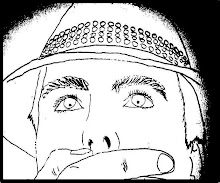“So where’s the demon got to?” wondered Prada.
“I imagine he would have thought it prudent to conceal himself, pending our arrival,” replied Teatime, who was himself straining to see out of the car window into the darkness. “He’s a bit dim, but he would know enough to keep out of sight once the police sirens started up.”
“Speaking of which,” said Mercury, “I don’t think we can hang around here for too long. Stop the car, but keep the engine running. Maybe it’ll realise we’re here and come out.”
Prada brought the car to a halt and they all waited.
“You could try phoning him,” said Teatime. With an annoyed why-didn’t-I-think-of-that grunt, Othello dug out his mobile and dialled. “No answer,” he said after a while, “Maybe its phone got damaged in the blast.”
“Or maybe it’s decided that this would be a chance to give us the slip, once and for all.” Said India darkly.
“Now look here!” cried Teatime, annoyed by the woman’s constant insinuations. “I don’t think that’s a very fair thing to say, given that he just saved all our lives. If he’d really wanted to get rid of us for good, he could have just run off, but he didn’t.”
India had the good grace to look abashed.
“Monkey’s got a point,” admitted Othello, “Let’s keep an open mind, shall we? I’ll send a text message, you never know.”
-0-0-0-
They had been travelling for just a couple of minutes but already they were out in the suburbs and, although he couldn’t be sure over the roar of the bike’s engine, Harold was pretty sure the sirens had been safely left behind. He was delighted to discover that zipping along the road in the dark, with the wind streaming though his hair was actually very pleasant. He’d have to get himself one of these marvellous machines!
The mysterious rider turned off the main road into a side street which rejoiced in the name Goose Egg Drive. It was a street of unremarkable family residences such as could be found in just about any town. About half way down the street, the rider slowed the bike and piloted it up onto the driveway of one of the houses. Ahead, a garage door was already rolling upwards and they slid neatly inside. They came to a halt in a very ordinary-looking domestic garage, complete with a pegboard of rusty tools, half-full tins of paint, packets of chemicals for getting rid of carpenter ants and all the usual bric-a-brac. Harold climbed off the bike, followed by the rider, who thumbed a remote control, closing the door.
Now that the rider was standing up, rather than sitting astride the bike, Harold could see that he or she was quite short – the top of his (or her) head only coming up to Harold’s shoulder. The rider reached up and lifted off the all-concealing helmet, to reveal a familiar knobbly brown head.
“Reverend Box!” exclaimed Harold.
“No. Mickey Mouse, who’d you think?” retorted the strange little man, setting down his helmet. “Come on in.” He led Harold through a door into the main part of the house and flicked on the lights. Bright fluorescent light flooded a tidy modern kitchen. The room’s ceiling fan began to turn lazily. After the nights alarums and excursions it all seemed bizarrely normal.
“You’ll be needing energy, no doubt,” said Box, “There’s some cold pizza over there and some olive oil in the cupboard if you need a lot of calories quickly. Don’t touch the jelly beans though, they’re all mine.”
“Pizza sounds good, thanks.” Harold flipped open the box and grabbed a slice. His recovery was going well, but the extra energy would speed him well on his way to being good as new.
Box leaned against the kitchen counter, his bike leathers creaking faintly, and faced Harold.
“So,” he said, folding his arms.
-0-0-0-0
“OK, let’s head back to Aunt Aggie’s,” sighed Mercury, “Doesn’t look like our friend is going to show up now.” There was a murmur of agreement from the others.
As the car began to make its way through the dark, litter-strewn streets, Teatime began to worry. The explosion wouldn’t have been fatal to Harold and he’d certainly had enough time to scamper up to the waiting car if he’d been skulking abut anywhere nearby, so where was he? Had he, as India had so mean-spiritedly suggested, made a bid for freedom? Teatime considered himself a good judge of character and this scenario struck him as extremely unlikely . Grabbing the bomb and removing it to a safe distance was the kind of altruistic nonsense that would have got Harold labelled a freak down in the Basement – actually, most other demons probably thought that about him already, what with his eternal reluctance to involve himself in his father’s diabolical affairs. No, he had been right to act as the demon’s champion, for what it was worth. So, if he had not run off, did this mean that he had disappeared like the other demons? Now that was an upsetting thought - not because Teatime had any huge amount of affection for Harold (although he was sort of vaguely likeable in his simpleminded way), but because it meant losing a useful asset. Harold’s father had always meant for Harold to serve as bait for whoever was behind the disappearances, but his intention had been that the circumstances should be more controlled and that Teatime should be able to report back in a little more detail than he just disappeared, my Lord. He shivered. Harold had better turn up soon or there’d be trouble.

No comments:
Post a Comment
I'm as needy as anyone, so your feedback is very welcome indeed.